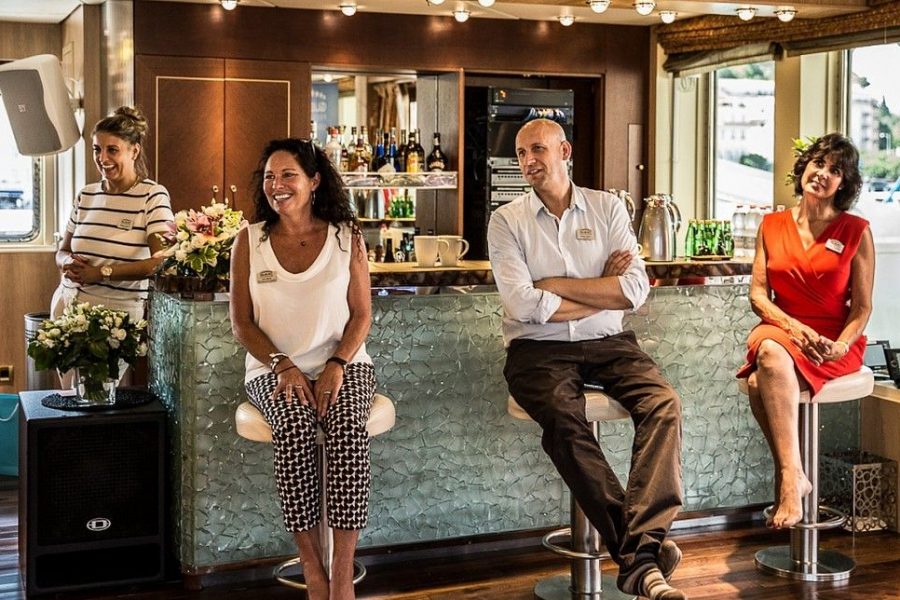Be our GUEST: Joey Meen tackles the importance of training for crew
By Georgia Tindale
Few people are more qualified to give their two pennies’ worth on the current state of crew training than Joey Meen. Having established, managed and run numerous successful RYA/MCA approved training schools in the UK and France for more than a decade, Joey set up her own yacht crew training consultancy business in 2004, before launching the GUEST Program in 2013 (Guidelines for Unified Excellence in Superyacht Training), of which she is now CEO, and which has since been adopted as the go-to bespoke training and certification platform within yachting.
Now holding down multiple high-profile industry roles, including Program Director for GUEST at IAMI (International Association of Maritime Institutions), Joey takes some time out of her ludicrously hectic schedule to offer her thoughts on the vital role which crew training plays in 2022, and provide the insider’s view on what it’s really like to work on a yacht.
A vital question for those new to the industry who might be too shy to ask. How much do yacht crew make?
When you enter the industry, you might be looking at €2,500-3,000 per month for a junior position, such as a junior deckhand or stewardess but it varies depending on the size of the vessel, the location and whether it is private or for charter.
There is an industry-standard for salaries, and thanks to information sharing, agencies and management companies are able to say, ‘this is the average wage, between ‘this’ and ‘this’’ for a position’, but it could be quite a big range: as much as a few thousand euros for example! As you rise up the ranks, your salary increases, with superyacht captains earning upwards of €15,000 per month on the larger vessels. There is a lot of information about crew salaries available online for those interested.
Do superyacht owners tip their crew?
Tipping on private yachts is done at the discretion of the owner, and they normally do tip. The tips for working on a charter vessel are far more guaranteed, as it is usually priced in with the charter fee – and you could be doing multiple charters back to back – whereas an owner might be on the boat for a few weeks or even months, and then just tip at the end. Typically on a charter trip, the tips are given to the captain to distribute and then shared between the crew.
Why did you first create the GUEST Program?
We first came up with the idea in 2008 at the Antibes Yacht Show during a PYA seminar about how to better support the interior crew department. We proposed that the PYA develop a bespoke training path for the interior crew – a suggestion that was met with a unanimous 100% ‘Yes’ vote from an audience of 200+ industry professionals and yacht crew.
As the PYA Training Director at the time, I took the lead, along with a large task force of volunteers. GUEST took five years to develop before launching in 2013. As for why, we wanted to establish a clear qualification and career route (with career opportunities included within that) for the interior department, as this had not been available before.
It is not so that crew have to pay out for courses they don’t need: our courses provide invaluable upskilling and training. They do wonders for crew self-confidence, longevity within the industry, and career progression both within yachting and outside of it.
What do you learn on a GUEST course?
It is hugely varied, and we now have lots of people enrolling who fall outside of the superyacht interiors department: the courses are suitable for people across the whole industry! It could include topics as specific as professional laundry, housekeeping, Russian food service, accounting and so on, but it also covers those all-important soft skills such as effective management, communication, team leadership and more.
As well as enabling crew members to give back by becoming more effective mentors and leaders to their crewmates, it’s all also part of a bigger picture to help create happier, more confident crew and boost camaraderie on board. This will also lead to more people staying in the industry for longer – people will want to stay in yachting if they feel both comfortable and fulfilled in their environment.
Crew mental health is a major talking point in the industry at the moment. How, if at all, can effective training help?
I think training can be massively helpful for promoting crew wellbeing. Even from the introductory levels of the GUEST programmes, and right through to the highest levels, we teach participants to be aware of their own mental health, to be aware of those around them, and educate them on how best to help others by spotting the early signs that someone is struggling. We aim to stop the escalation of any issues before they become something that might result in more serious mental health conditions such as depression.
This all sounds great! When can I sign up?
You can sign up right now! We have 23 training schools all around the world which I audit which are under the IAMI umbrella. These offer a wide range of courses at all levels at different times, so it’s just a question of tapping into one of the training schools and finding out what they’ve got available, and the most convenient location for yourself. You can find out more information on the GUEST programme website here.
To find out more about current yacht crew roles available, check out our Yotspot vacancies here.


